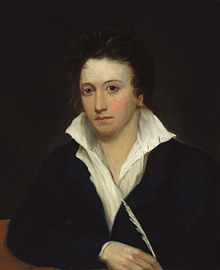User:Awilt/sandbox
'An Exhortation' By Percy Bysshe Shelley
[edit]About the Author
[edit]
Percy Bysshe Shelley (4 August 1792 - 8 July 1822) was born in Field Place, near Horsham, Sussex, the eldest son of Sir Timothy Shelley, a Whig Member of Parliament. Shelley is considered as one of the six major English Romantic poets alongside such figures as William Wordsworth, Samuel Taylor Coleridge, William Blake, John Keats and Shelley's close friend Lord Byron. Shelley is well known for his radical political views and some have seen him as a modern forefather of atheism, nonviolent resistance, vegetarianism and the free love movement. 'An Exhortation' was published in 1820, during Shelley's travels in Italy with his wife Mary Shelley (the author of such works as Frankenstein), two years before Shelley's premature death at the age of 29.


The Poem, 'An Exhortation'
[edit]<poem>Chameleons[1] feed on light and air: Poets' food is love and fame: If in this wide world of care Poets could but find the same With as little toil as they, Would they ever change their hue As the light chameleons do, Suiting it to every ray Twenty times a day?
Poets are on this cold earth, As chameleons might be, Hidden from their early birth In a cave beneath the sea; Where light is, chameleons change: Where love is not, poets do: Fame is love disguised: if few Find either, never think it strange That poets range.
Yet dare not stain with wealth or power A poet's free and heavenly mind: If bright chameleons should devour Any food but beams and wind, They would grow as earthly soon As their brother lizards are. Children of a sunnier star, Spirits from beyond the moon, O, refuse the boon![2]
About the Poem
'An Exhortation' [3], by Percy Bysshe Shelley was written in 1820 and was created to advise and counsel his reader and other poets alike, as the title suggests. This advice concerned the taking of stipends,[4] as Shelley and other poets such as Lord Byron would criticize other poets such as William Wordsworth for their taking of a regular stipend from the government in order to produce literature which would adhere to popular views of the time.
Therefore this poem is from a collection of poems criticizing this practice. From the beginning of the poem, this may not be apparent as Shelley merely compares the traits of a chameleon to that of poets. However, using this device, Shelley highlights the differences between the two, and the poet's ability to change through inability to find love or recognition. However, rather than a literal comparison, Shelley uses the metaphor of the changing Chameleon to represent the poet's need to voice popular and ever-changing views of society, at the time in which the poem was written, and mock the fickle nature of society's views. This can be seen by the phrase 'Suiting it to every ray Twenty times a day'. This phrase, with its exaggerated tone, reveals Shelley deems the views of public society as ill-founded and unstable.
The most obvious reference to the moralistic nature of this poem is the direct, imperative language used during the last line of the text,'oh refuse the boon!'. This direct reference to the taking of stipends(or boon), reveals Shelley's desire for poets to refuse the rewards offered by the government and produce poetry which does not simply adhere to popular beliefs of the time. As a poet who was known for his controversial opinions through literature, this poem reveals that he desired other poets to follow this idea and use literature to evoke feeling rather than as a method of reward.

